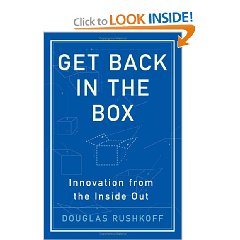 Single best book I have read in past five years
Single best book I have read in past five years
January 27, 2008
David Bornstein
I read a lot, almost totally non-fiction, and for the past several years, after accidentally becoming a top Amazon reviewer on the strength of 300 reviews lifted from the annotated bibliographies of my first two books, I have been dedicated, as a hobby, to reading in the service of the public. My goal in life at the age of 55, what I learned from this book is called an “encore career,” is to be intelligence officer to the five billion poor, and–I now realize from this book–to the social entrepreneurs that are changing the world on a scale and with a speed that governments cannot match.
This book blew my mind, literally. It has not altered my course, but it has dramatically accelerated my ability to make progress by illuminating a path I thought I would have to discover. This book is the first “map” of a completely new form of endeavor, profoundly individual in inspiration and global in scale, that of social entrepreneurship, not to be confused with non-profit or non-governmental, more traditional forms.
The author, apart from mapping examples (33, focused on education, health, protection, and access to electricity and technology), provides what I consider to be the single best preface/introduction I have ever read. Here are a few of the underlined bits:
+ hidden history unfolding
+ landscape of innovators
+ ratio of problem-focused information to solution-focused information is completely out of balance
+ reality distorted, people deprived of knowledge they could use
+ individual social entrepreneurs advancing systemic scalable solutions
+ new sector of social entrepreneurship now being taught, funded, and respected
+ two Nobel Peace Prizes (2004, 2006)–micro-finance now micro-everything
+ Ashoka, founded by Bill Drayton is the spine of the book
+ conceptual firewalls coming down, “whole brains” being used
+ influencing conventional businesses (going green, good) and governments (adopting unconventional education, kids teaching parents, etc)
+ “social entrepreneurs are uniquely suited to make headway on problems that have resisted considerable money and intelligence”
+ government are looking at problems from the outside, social entrepreneurs see problems–and solutions–from the inside
+ scale still a challenge, but coming
+ Students and local groups actively interested in hearing about this now
+ Students are leading the way, pushing for change in curriculums
+ optimism, hope, energy are being unleashed as never before–but not being properly mapped, reported, or appreciated outside small circles
+ new pathways being discovered every day in every place
+ changemakers far more numerous than any might have imagined
+ many levels of changemaker
+ charaqcterized by first-hand active engagement in reality
+ individuals driven to understand, and driven to remove shackles from others with shared knowledge (e.g. kids learning to fix pumps and spreading knowledge across villages with a speed and energy only quick-witten children could apply)
+ social entrepreneurship network now has sensors everywhere, millions of changemarkers, tens of thousands of organizations
+ far better mechanism to respond to needed than we have ever had before
+ decentralized and emergent force
BAD NEWS:
– not yet properly financed
– lacking holistic public intelligence for voluntary harmonization against the ten threats, with the twelve policies, with a special focus on the eight challengers. (Learn more at Earth Intelligence Network)
+ emphasis on metrics slows down the needed pace of funding for innovation
Core principles for social excellence (chapter twelve):
+ Putting Children in Charge
+ Enlisting “Barefoot” Professionals
+ Designing New Legal Frameworks for Environmental Reform
+ Helping Small Producers Capture Greater Profits
+ Linking Economic Development and Environmental Protection
+ Unleashing Resources in the Community You Are Serving
+ Linking the Citizen, Government, and Business Sectors for Comprehensive Solutions (this is where shared public intelligence and a shared Range of Gifts Table can harmonize disparate capabilities with a common interest in stabilization, reconstruction, humanitarian assistance, and relief)
The book ends with a superb resource section including the following headings for lists of one-line access points:
+ Resources for People Seeking Jobs and Volunteer Opportunities
+ Organizations that Identify and/or Support (or Invest in) Social Entrepreneurs
+ Management, Funding, and Networking Resources for Citizen Organizations
+ Academic-Based Resources
+ Resources for Funders
+ Resources for Businesspeople
The notes and index are totally professional.
I put this book down with one final note: WOW!!!
This is an Earth-changing book, an utterly brilliant, timely, ethical, wonderful piece of scholarship, journalism, vision and information sharing. I actually have tears in my eyes. This book is Ref A for saving the Earth seven generations into the future and beyond.
Other books that support this one, but this one is unique:
A Power Governments Cannot Suppress
The Tao of Democracy: Using Co-Intelligence to Create a World That Works for All
The Change Handbook: The Definitive Resource on Today's Best Methods for Engaging Whole Systems
The World Cafe: Shaping Our Futures Through Conversations That Matter
Leadership and the New Science: Discovering Order in a Chaotic World
Escaping the Matrix: How We the People can change the world
Society's Breakthrough!: Releasing Essential Wisdom and Virtue in All the People
Collective Intelligence: Mankind's Emerging World in Cyberspace
The Wealth of Networks: How Social Production Transforms Markets and Freedom
The Fortune at the Bottom of the Pyramid: Eradicating Poverty Through Profits (Wharton School Publishing Paperbacks)
See also the books I have written, helped edit, or published, including our forthcoming COLLECTIVE INTELLIGENCE: Creating a Prosperous World at Peace, edited by Mark Tovey with 55 contributors. It will be on Amazon 1 March 2008, and is offered free online at Earth Intelligence Network.
In addition, I recommend the “52 Tough Questions” with transpartisan answers at Earth Intelligence Network, that address the ten high-level threats to humanity as identified by the UN study on “Creating a More Secure world” (free online and also sold via Amazon), the twelve policies that must be harmonized, and the eight challengers whom we must help avoid our mistakes of the past 100 years.
This book by David Bornstein could not have come into my life at a better time–the New York Times calls it a bible in the field, I consider it to be my inspiration for my encore career. Simply spectacular. AMAZING–not just the book, but every person and organization the book names and discusses. WOW!!!











